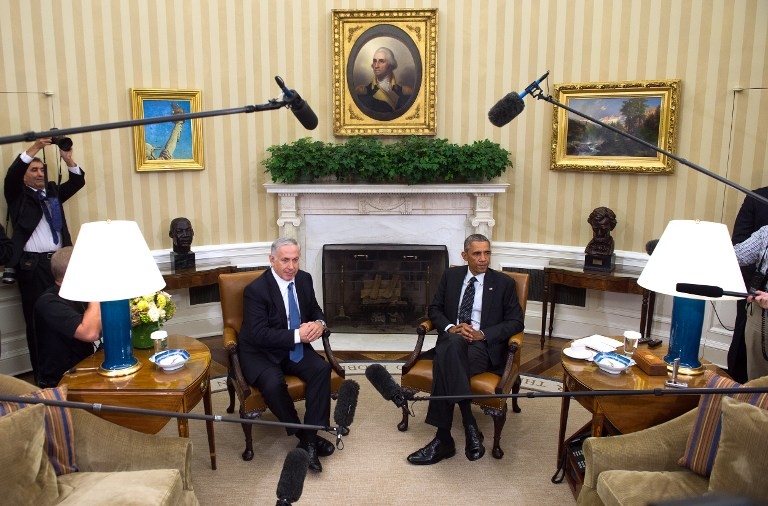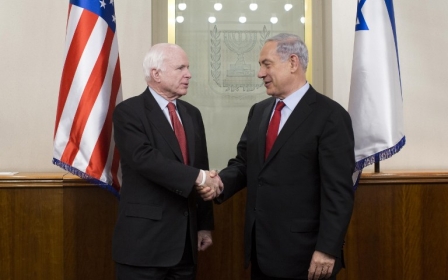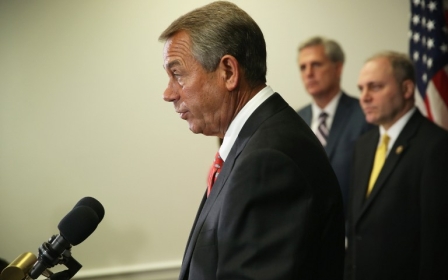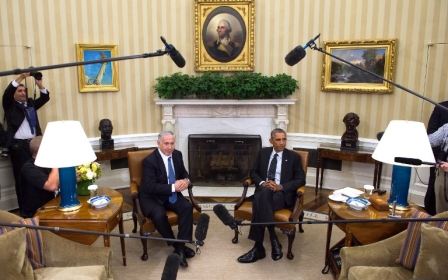ANALYSIS: The Obama-Netanyahu clash - five questions answered
Analysts offer their take on Obama, Netanyahu, the Iran deal and the Israeli-Palestinian conflict

Obama says he will not meet Netanyahu when he comes to the US to address Congress (AFP file photo)
Published date: Vendredi 13 février 2015 - 10:45
|
Last update: 9 years 9 months ago
NEW YORK - It was no secret that US President Barack Obama and Benjamin Netanyahu have not seen eye to eye. As far back as November 2011, Obama was overheard sniping about Israel’s Prime Minister, complaining: “I have to deal with him every day.”
Strains were palpable in October, when an Obama administration official called Netanyahu a “chickenshit”. But in the past, officials on both sides tried to smooth over policy differences on such topics as Iran’s nuclear programme and Israel’s settlement-construction on Palestinian soil.
Nowadays, there are fewer efforts to paper over the cracks. This was highlighted by Netanyahu’s recent decision to address Congress on 3 March and voice concerns about Obama’s bid to lift sanctions against Iran in exchange for guarantees that it will not build nuclear weapons.
Obama says he will not meet the visiting leader, saying he does not want to influence Israeli elections on 17 March. The US president promises to veto Republican-led efforts to impose new sanctions on Iran via Congress, saying such a move will kibosh any deal with Tehran.
After more than 18 months of high-stakes talks, the US, Britain, China, France, Germany and Russia have agreed with Iran to try and reach a political accord by 24 March, ahead of a full-blown deal by a self-imposed 30 June deadline.
Middle East Eye asked analysts for their take on Obama, Netanyahu and the Iran deal.
How bad is the Obama-Netanyahu spat?
“It’s difficult to think of a time when the leaders of Israel and the US were on worse personal terms,” Plymouth University lecturer Christian Emery told MEE. “There is deep anger in the White House over Netanyahu believing he can go over the head of the president to try and influence US foreign policy.”
Foreign statesmen addressing a joint meeting of Congress are not uncommon: the leaders of Ukraine, Petro Poroshenko and South Korea, Park Geun Hye, have had the honour in the past two years. But the pulpit is typically not used to attack a sitting US president’s policy.
Netanyahu was invited by the US House of Representatives Speaker John Boehner, a Republican, who did not inform the White House or Congressional Democrats. Such a move is “very unusual,” if not unprecedented, said James Fallows in The Atlantic.
For Josh Ruebner, a policy chief at the US Campaign to End the Israeli Occupation, Obama-Netanyahu relations troughed long ago and show no signs of improving. “It’s no shock to anyone that there’s no love lost between these two leaders,” he told MEE.
How likely is a patch-up?
Most analysts say the Obama-Netanyahu relationship is kaput – the big question is who will leave office first. Obama vacates the White House in January 2017; Netanyahu could lose his premiership after next month’s vote, or win a fourth term. Pollsters say it could go either way.
“Everyone’s in a wait-and-see mode until after 17 March,” Neri Zilber, an analyst at The Washington Institute for Near East Policy, told MEE. “The timing of Netanyahu’s speech to Congress is based on the Israeli election cycle. He is pandering to his right-wing base, which has no love for this US administration. It gives him a high-visibility, prime ministerial platform.”
For Ruebner, Netanyahu has chosen Republicans as long-term bedfellows. “It exposes greater symbiosis between the Republican party and Israel, with Israel becoming a conservative, right-wing issue in the American body politic,” he said.
What will Netanyahu tell Congress?
Netanyahu views a nuclear-armed Iran as an existential threat to Israel, and has compared the Islamic Republic to the war-hungry Nazi Germany of 1938. He will urge the US and other powers not to negotiate an Iranian nuclear deal that might endanger Israel, he says.
Analysts are divided over whether Netanyahu fears he is being sold out by Obama and seeks to torpedo talks with Iran, or just wants to pressure the White House into maintaining a tough line so that the eventual nuclear deal is more stringent.
According to Ruebner, Netanyahu wants to “scupper the negotiations” by building “political support for an additional round of sanctions on Iran a few weeks before the deadline.” Zilber disagrees. Netanyahu “wants the Obama administration to hold a harder line and threaten additional sanctions” in the event of talks breaking down, he said.
The Israeli leader may have been surprised by some of the angry responses to news of his Congressional address – from Israel-friendly US Democrats and politicians at home, added Ruebner.
“After the backlash, I’m not sure he’s coming,” he said.
“Netanyahu made a fatal mistake by asking his Democratic friends to choose between supporting him and humiliating the Democratic president,” added Emery. “Foreign policy can be a partisan issue, but attempts to make it so by foreign leaders, even close allies, is a step too far.”
Will it scupper the Iran talks?
Talks between the six world powers and Iran have been repeatedly extended because of slow progress; last month’s meeting in Geneva made little headway. As well as negotiators reaching a deal, the bargain must also be palatable to hardliners in Tehran and Washington. New Congressional sanctions at this stage would force an Iranian exit from talks, Obama says, making war more likely.
By raising the spectre of another US conflict in the Middle East to a war-weary US audience, Obama has changed the “underlying politics of the matter,” said Trita Parsi, president of the National Iranian American Council.
“The debate over Iran sanctions is no longer about Iran, but about war with Iran. Diplomacy with Iran is the best way of avoiding both a nuclear Iran, and bombing Iran. Any measure that undermines diplomacy, such as new sanctions, automatically enhances the risk of war,” he said.
Emery, a UK-based international relations scholar, says diplomacy with Tehran can succeed.
“What really irritates Obama is that he truly believes that his diplomatic strategy with Iran will prevent Iran from developing nuclear weapons,” he told MEE. “If Congress and Israel succeed in torpedoing a deal, Obama ultimately believes that Israel’s security is more threatened.”
Will it impact the Israel-Palestine peace process?
US-backed peace talks between Israelis and Palestinians broke down last year; the outlook for future negotiations is bleak. Palestinians have sought to “internationalise” their statehood quest via the UN and the International Criminal Court (ICC), a war crimes tribunal.
According to Zilber, Obama-Netanyahu tensions will not derail Washington’s long-standing support for Israel, which has been demonstrated by US-led efforts to stymie Palestinians at the UN and the ICC.
“The US position has been fairly consistent with respect to the helpfulness of the Palestinians going to the international realm,” he told MEE. “Even the Palestinians admit it’s simply a pressure tactic against Israel, and ultimately they have to sit down with Israelis and negotiate.”
Ruebner agrees, saying the leaders’ rapport is just window dressing. US military aid and US diplomatic cover have reached all-time highs despite top-level tensions. “Even if they don’t get along on a personal level, it hasn’t inhibited the US from becoming more deeply complicit in Israel’s oppression of the Palestinians,” he added.
Middle East Eye propose une couverture et une analyse indépendantes et incomparables du Moyen-Orient, de l’Afrique du Nord et d’autres régions du monde. Pour en savoir plus sur la reprise de ce contenu et les frais qui s’appliquent, veuillez remplir ce formulaire [en anglais]. Pour en savoir plus sur MEE, cliquez ici [en anglais].




